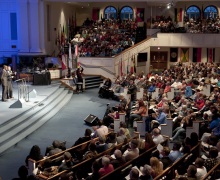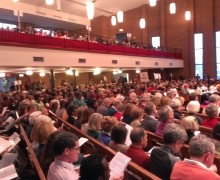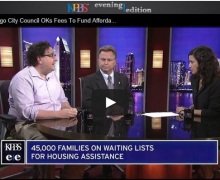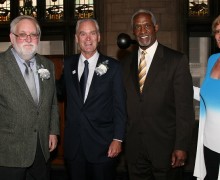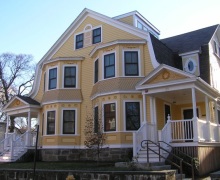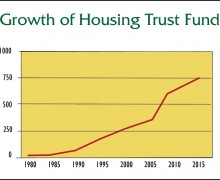Boston Linkage Fee for Large-Scale Developments Produces Jobs and Housing
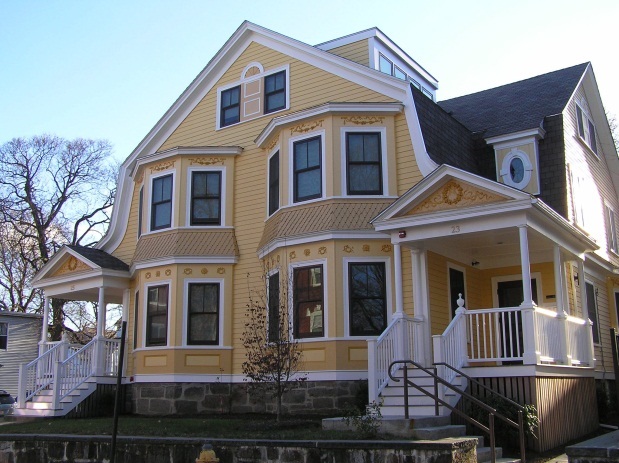
If meeting a growing demand for early education professionals by providing education and skill building programs to Boston residents wanting to enter the field and improve their earning potential seems like a win-win proposition, the City of Boston’s Jobs and Community Services (JCS) Office would agree. The JCS recently awarded the Action for Boston Community Development $50,000 for its Early Education NextSTEPS program, which offers Boston residents free education and training for entry-level. NextSTEPS is a 15-week program involving coursework in child growth and development and college-level writing, non-credit training in CPR and first aid, and career and life skills training such as resume preparation and personal financial management.
The funding for the NextSTEPS program was part of more than $1 million the JCS awarded to nineteen community-based employment and workforce development programs from the Neighborhood Jobs Trust in early October. With an emphasis on connecting Boston residents with “permanent and quality” jobs, the funding awards, ranging from $25,000 to $90,000, were made to training programs that are tied to areas of growing job opportunities and that take an integrated approach, developing skills that could lead to employment opportunities in multiple industries or services.
The Neighborhood Jobs Trust, along with Neighborhood Housing Trust, is supported by linkage fees from large-scale real estate development projects as a means of providing benefits to Boston residents who may be affected by development in their neighborhoods. Linkage fees are levied on non-residential developments, normally upon receipt of the building permit or prior to construction. The proceeds are used to fund the construction of affordable housing residential developments and to fund Job Training Programs. Confronted with the challenge of balancing large-scale commercial development with residential construction and an existing workforce in need of new job skills, the City of Boston established the Neighborhood Housing Trust (NHT) in 1986. As stated in its Declaration of Trust: “This Trust is established to promote the public health, safety, convenience and welfare by mitigating the extent to which Boston’s low or moderate income households are unable to afford decent, safe and sanitary housing within the City of Boston.”
The Neighborhood Housing Trust requires that all new large-scale commercial real estate developments exceeding 100,000 square feet and requiring zoning relief, including expansion and rehabilitation projects, make either a cash payment or directly create housing or a job-training program. Cash payments are received by both the Neighborhood Housing Trust and the Neighborhood Jobs Trust for distribution. For commercial development In the area defined as “neighborhood,” housing payments are made over a seven year period beginning with the earlier of either the issuance of an occupancy permit or two years from issuance of a building permit; for commercial development in the area defined as “downtown,” payments are made over a seven-year period, beginning upon issuance of the building permit. Jobs payments are made over a two-year period, the first due at issuance of the building permit, regardless of the location of the development. Development Impact Project agreements serve as contracts by which the developer and the Boston Redevelopment Authority (BRA) confirm the payment of linkage fees.
A developer who chooses to fulfill its housing-related linkage obligation with a housing payment contributes $8.34 for every square foot of gross floor space of Development Impact Project uses in excess of 100,000 square feet into the Neighborhood Housing Trust. Using a competitive application process, the Neighborhood Housing Trust awards funds to projects that provide affordable housing. Projects may be homeownership, rental, cooperative or other forms of permanent or transitional housing, including new construction, rehabilitation of abandoned or occupied rental property, or conversion of non-residential property. Eligible projects must meet the following criteria:
- The project must meet a “but for” test–that is, without (but for) linkage funding, the project would not be feasible;
- Trust funds will assist only housing units affordable to low and moderate-income households at or below 80% of median income for the Boston area;
- Homeowner units must be affordable for a minimum of 50 years (30 years, with 20-year renewal option); rental units must be affordable in perpetuity;
- The developer must have site control, and the proposed project must be financially feasible and meet the requirements of the state sanitary and building codes;
- The units shall be developed in compliance with the Boston Jobs Ordinance, the City of Boston Fair Housing Commission guidelines, and other applicable fair housing and equal opportunity requirements.
In addition to the eligibility requirements, the Neighborhood Housing Trust establishes competitive criteria that is included in the Request for Proposals.
As an alternative to Housing Payments, developers may fulfill their linkage obligation by creating or directly assisting in the creation of housing for low-and moderate-income residents of the city. The cost of this Housing Creation option must be equivalent to the housing payment the developer would have made. Housing Creation proposals must conform to the BRA’s written housing creation regulations, which govern how a project comes to fruition by laying out a number of options developers may pursue, such as directly creating housing or channeling the net present value of the linkage obligation to an entity approved by the BRA to construct affordable housing. All Housing Creation proposals must be recommended by the NHT for BRA approval.
The NHT is governed by seven trustees: the president of the City Council (ex officio) or his or her designee, the City of Boston’s Collector-Treasurer (ex officio), and five mayoral appointees. The Collector-Treasurer serves as managing trustee and is responsible for maintaining the financial records and administering the trust funds. Through September 2014, the NHT has invested more than $148 million in affordable homes, creating or preserving 10,725 affordable units in 206 developments throughout the city. According to a NHT 2012 report, a survey of linkage programs across the United States indicated that the NHT has raised more money and generated more housing than any similar municipal program.
To learn more about the NHT you may visit the DND Website or please contact Theresa Gallagher, Secretary to the Trust at (617) 635-0325 or tgallgher.dnd@cityofboston.gov or Christine O’Keefe at (617) 635-0351 or cokeefe.dnd@cityofboston.gov.




